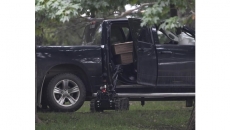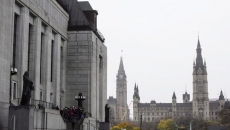Time and food supplies are running out for two giant pandas at the Calgary Zoo.
Er Shun and Da Mao arrived in Calgary in 2018, along with cubs Jia Panpan and Jia Yueyue, after spending five years at the Toronto Zoo. The cubs were returned to China in January and their parents were to remain in Calgary until 2023.
Calgary Zoo president Clement Lanthier said the facility spent months trying to overcome transportation barriers in acquiring fresh bamboo. Officials decided in May that it was best for the animals to be home in China, where their main food source is abundant.
But he said China hasn't been able to approve international permits, as the COVID-19 pandemic created changes to import laws and animal quarantine facilities.
"We believe the best and safest place for Er Shun and Da Mao to be during these challenging and unprecedented times is where bamboo is abundant and easy to access," Lanthier said in a release Wednesday.
"The continued delays in international permitting is putting the health and welfare of these two beautiful giant pandas in jeopardy."
Giant pandas have unique nutritional requirements and 99 per cent of their diet is made up of fresh bamboo. Each adult consumes about 40 kilograms daily.
The zoo originally had contingency plans for a steady supply of fresh bamboo, but limits on flights from China was the first problem. Initially Hainan Airlines flights carried the food to Toronto where WestJet would fly it back to Calgary. Since then the number of flights and cargo space has dwindled.
Lanthier said the animals didn't like some kinds of bamboo and other supplies that arrived were past their expiry.
Now the zoo is only able to source fresh bamboo reliably from British Columbia, and that supply is expected to run out in September.
Greg Royer, the zoo's chief operating officer, said the concern is the supply isn't guaranteed.
"We will scramble. We will take care of these pandas. We will move heaven and earth to make sure they're taken care of but the problem is after September it becomes progressively more and more difficult, especially as winter comes," said Royer in an interview.
"What if we do have a day when we can't feed them? The animals won't starve but that's certainly not something that fits within the Calgary Zoo's standard of care."
Royer said the necessary permits have already been granted by the Canadian government but the delay in approval is coming from China.
He said the animals remain in quarantine and are in good health.






